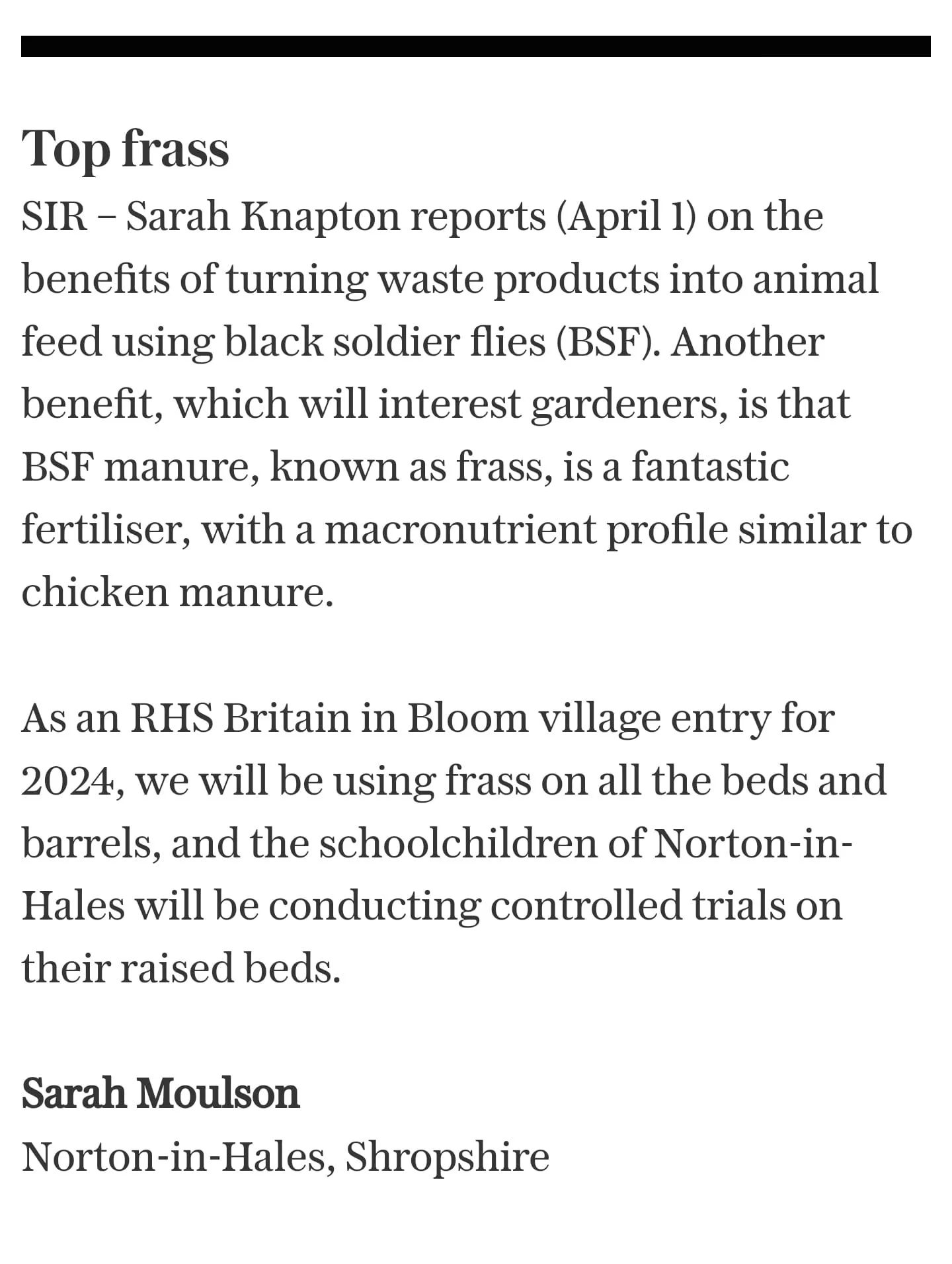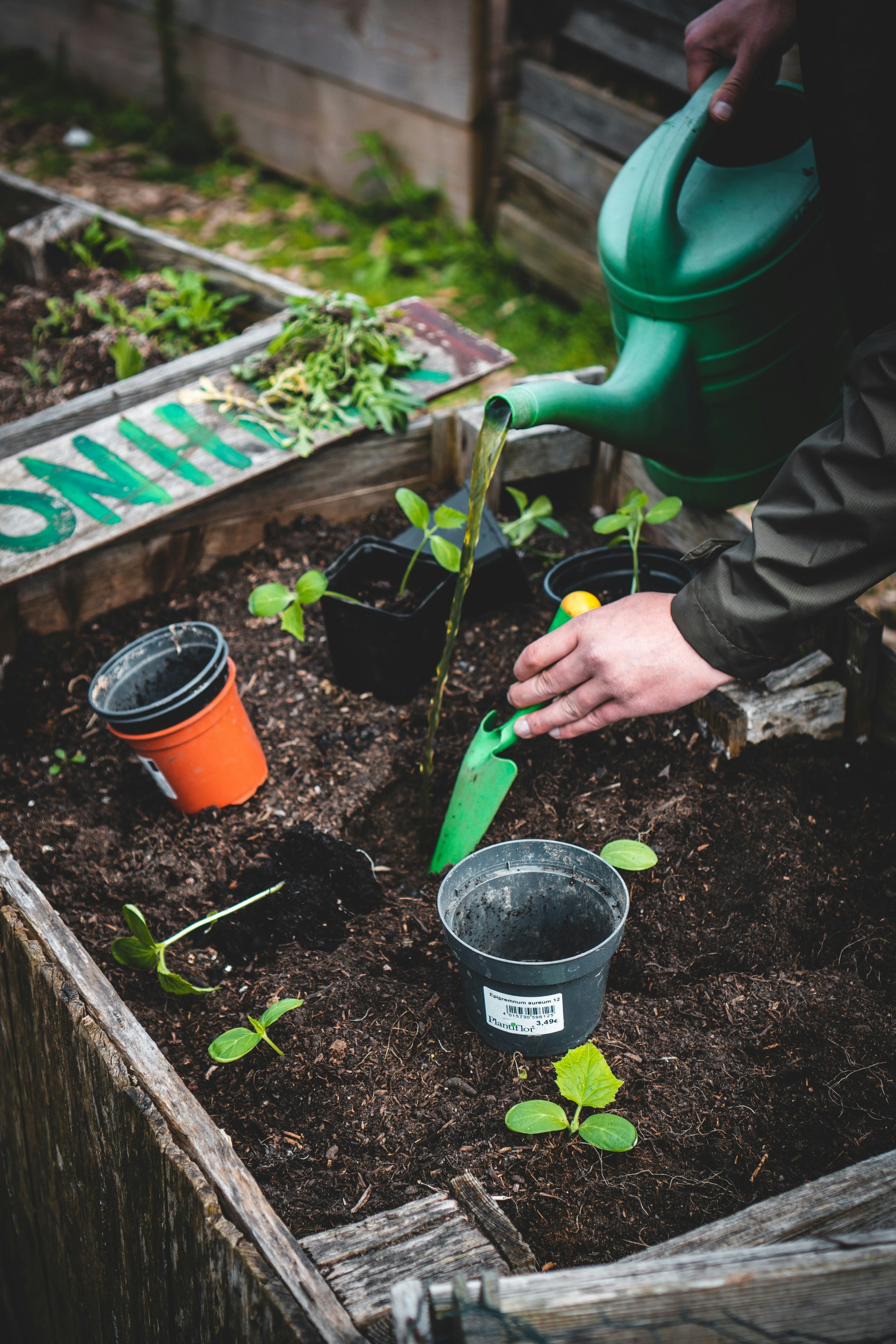Top Frass
Fly2Feed was featured in the Daily Telegraph today for the local village community project that is using BSF frass to trial growth rates of the plants. This will be monitored by the schoolchildren to help educate in both science and the natural world.
Daily Telegraph article, 02/04/24
What the frass am I talking about?
In the realm of sustainable agriculture and waste management, one tiny yet powerful creature has been gaining attention: the black soldier fly (BSF) and its by-product, frass. While the black soldier fly itself has been recognized for its ability to convert organic waste into valuable resources, its frass, or excrement, is emerging as a potent biofertilizer with numerous benefits. In this article, we delve into the uses, key benefits, and future value opportunities of black soldier fly frass.
Uses of Black Soldier Fly Frass:
Organic Fertilizer: One of the primary uses of black soldier fly frass is as an organic fertilizer. Rich in nitrogen, phosphorus, potassium, and other essential nutrients, frass acts as a natural soil conditioner, promoting plant growth and enhancing soil health.
Soil Amendment: Frass improves soil structure and water retention, making it an ideal amendment for various soil types. Its slow-release nutrients ensure sustained nourishment for plants, contributing to higher yields and improved crop quality.
Biological Pest Control: Research suggests that black soldier fly frass possesses insect-repellent properties, making it a potential tool for biological pest control. When applied to crops, it may help deter pests, reducing the need for chemical pesticides.
Companion Planting: Frass can be utilized in companion planting strategies, where certain plants are grown together to enhance growth, repel pests, or improve soil quality. Its nutrient content makes it an excellent supplement for companion plants, fostering symbiotic relationships in the garden.
Key Benefits of Black Soldier Fly Frass:
Sustainability: Black soldier fly frass represents a sustainable solution for managing organic waste. By converting waste into valuable fertilizer, it reduces the burden on landfills and mitigates environmental pollution.
Nutrient-Rich: Frass contains a balanced array of essential nutrients, including nitrogen, phosphorus, potassium, calcium, and micronutrients. Its organic composition promotes healthier plant growth without the risk of chemical runoff.
Soil Health: Regular application of frass improves soil structure, fertility, and microbial activity. It enhances soil biodiversity and resilience, leading to increased nutrient uptake by plants and reduced dependency on synthetic fertilizers.
Cost-Effective: While initially produced as a by-product of black soldier fly larvae farming, frass has gained popularity as a cost-effective alternative to conventional fertilizers. Its benefits outweigh the initial investment, offering long-term value for farmers and gardeners.
Future Value Opportunities:
The future of black soldier fly frass holds immense potential across various sectors:
Agriculture: As sustainable agriculture practices continue to gain traction, the demand for organic fertilizers like black soldier fly frass is expected to rise. Its role in regenerative agriculture and soil restoration programs could drive market growth.
Biotechnology: Ongoing research explores the potential applications of black soldier fly frass in biotechnological processes, such as biofuel production, waste bioremediation, and pharmaceuticals. Frass-derived compounds may unlock novel solutions in diverse fields.
Circular Economy: Frass contributes to the circular economy by closing the loop on organic waste management. Integrating black soldier fly larvae farming with food waste processing systems could create circularity in resource utilization, reducing waste and promoting sustainability.
Urban Agriculture: In urban environments where space is limited, black soldier fly frass offers a compact and efficient solution for nutrient recycling and urban agriculture. Vertical farming, rooftop gardens, and community green spaces could benefit from its use.
What does all this mean?
Black soldier fly frass represents a paradigm shift in sustainable agriculture and waste management. As society seeks eco-friendly alternatives to conventional practices, the potential of frass as a biofertilizer and soil amendment cannot be overstated. With its nutrient-rich composition, environmental benefits, and diverse applications, frass embodies the essence of a circular economy—a sustainable solution rooted in nature's wisdom.
As research and innovation continue to unfold, the journey of black soldier fly frass from waste to resource heralds a greener, more resilient future for agriculture and beyond.



